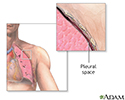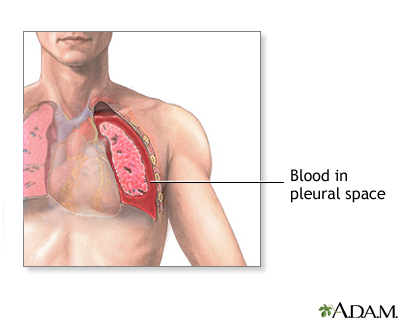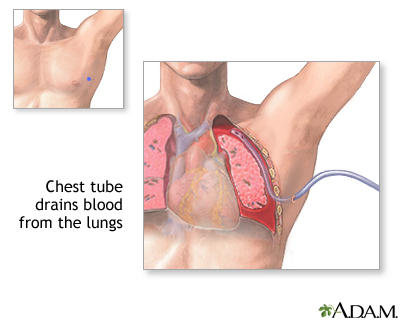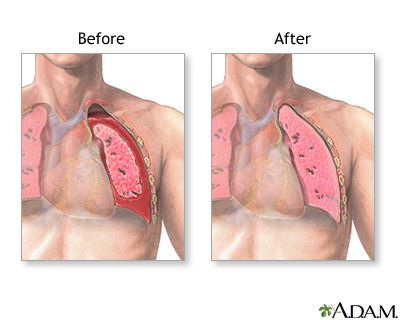Empyema
Empyema - plural; Pyothorax; Pleurisy - purulent
Empyema is a collection of pus in the space between the lung and the inner surface of the chest wall (pleural space).
Causes
Empyema is usually caused by an infection that spreads from the lung. It leads to a buildup of pus in the pleural space.
There can be a pint (1/2 liter) or more of infected fluid. This fluid puts pressure on the lungs.
Risk factors include:
-
Bacterial pneumonia
Bacterial pneumonia
Pneumonia is a breathing (respiratory) condition in which there is an infection of the lung. This article covers community-acquired pneumonia (CAP). ...
 ImageRead Article Now Book Mark Article
ImageRead Article Now Book Mark Article -
Tuberculosis
Tuberculosis
Pulmonary tuberculosis (TB) is a contagious bacterial infection that involves the lungs. It may spread to other organs.
 ImageRead Article Now Book Mark Article
ImageRead Article Now Book Mark Article - Chest surgery
-
Lung abscess
Lung abscess
Pneumonia is a breathing condition in which there is swelling or an infection of the lungs or large airways. Aspiration pneumonia occurs when food, ...
 ImageRead Article Now Book Mark Article
ImageRead Article Now Book Mark Article - Trauma or injury to the chest
In rare cases, empyema can occur after thoracentesis . This is a procedure in which a needle is inserted through the chest wall to draw off fluid in the pleural space for medical diagnosis or treatment.
Thoracentesis
Thoracentesis is a procedure to remove fluid from the space between the lining of the outside of the lungs (pleura) and the wall of the chest....
Symptoms
Symptoms of empyema may include any of the following:
-
Chest pain
, which worsens when you breathe in deeply (pleurisy)
Chest pain
Chest pain is discomfort or pain that you feel anywhere along the front of your body between your neck and upper abdomen.
 ImageRead Article Now Book Mark Article
ImageRead Article Now Book Mark Article -
Dry
cough
Cough
Coughing is an important way to keep your throat and airways clear. But too much coughing may mean you have a disease or disorder. Some coughs are d...
 ImageRead Article Now Book Mark Article
ImageRead Article Now Book Mark Article -
Excessive sweating
, especially night sweats
Excessive sweating
Sweating is the release of liquid from the body's sweat glands. This liquid contains salt. This process is also called perspiration. Sweating helps...
 ImageRead Article Now Book Mark Article
ImageRead Article Now Book Mark Article -
Fever
and chills
Fever
Fever is the temporary increase in the body's temperature in response to a disease or illness. A child has a fever when the temperature is at or abov...
 ImageRead Article Now Book Mark Article
ImageRead Article Now Book Mark Article -
General discomfort, uneasiness, or ill feeling (
malaise
)
Malaise
Malaise is a general feeling of discomfort, illness, or lack of well-being.
Read Article Now Book Mark Article -
Shortness of breath
Shortness of breath
Breathing difficulty may involve:Difficult breathingUncomfortable breathingFeeling like you are not getting enough air
 ImageRead Article Now Book Mark Article
ImageRead Article Now Book Mark Article -
Weight loss
(unintentional)
Weight loss
Unexplained weight loss is a decrease in body weight, when you did not try to lose the weight on your own. Many people gain and lose weight. Uninten...
Read Article Now Book Mark Article
Exams and Tests
The health care provider may note decreased breath sounds or an abnormal sound (friction rub) when listening to the chest with a stethoscope ( auscultation ).
Auscultation
Auscultation is listening to the sounds of the body during a physical examination.

Tests that may be ordered include:
-
Chest x-ray
Chest x-ray
A chest x-ray is an x-ray of the chest, lungs, heart, large arteries, ribs, and diaphragm.
 ImageRead Article Now Book Mark Article
ImageRead Article Now Book Mark Article -
CT scan
of chest
CT scan
A computed tomography (CT) scan is an imaging method that uses x-rays to create pictures of cross-sections of the body. Related tests include:Abdomin...
 ImageRead Article Now Book Mark Article
ImageRead Article Now Book Mark Article -
Pleural fluid analysis
Pleural fluid analysis
Pleural fluid analysis is a test that examines a sample of fluid that has collected in the pleural space. This is the space between the lining of th...
Read Article Now Book Mark Article -
Thoracentesis
Thoracentesis
Thoracentesis is a procedure to remove fluid from the space between the lining of the outside of the lungs (pleura) and the wall of the chest....
Read Article Now Book Mark Article
Treatment
The goal of treatment is to cure the infection. This involves the following:
- Placing a tube in your chest to drain the pus
- Giving you antibiotics to control the infection
If you have problems breathing, you may need surgery to help your lung expand properly.
Outlook (Prognosis)
When empyema complicates pneumonia, the risk of permanent lung damage and death goes up. Long-term treatment with antibiotics and drainage are needed.
In general, most people fully recover from empyema.
Possible Complications
Having empyema may lead to the following:
- Pleural thickening
- Reduced lung function
When to Contact a Medical Professional
Call your health care provider if you develop symptoms of empyema.
Prevention
Prompt and effective treatment of lung infections may prevent some cases of empyema.
References
Broaddus VC, Light RW. Pleural effusion. In: Broaddus VC, Mason RJ, Ernst JD, et al., eds. Murray and Nadel's Textbook of Respiratory Medicine . 6th ed. Philadelphia, PA: Elsevier Saunders; 2016:chap 79.
McCool FD. Diseases of the diaphragm, chest wall, pleura, and mediastinum. In: Goldman L, Schafer AI, eds. Goldman's Cecil Medicine . 25th ed. Philadelphia, PA: Elsevier Saunders; 2016:chap 99.
-
Lungs - illustration
The major features of the lungs include the bronchi, the bronchioles and the alveoli. The alveoli are the microscopic blood vessel-lined sacks in which oxygen and carbon dioxide gas are exchanged.
Lungs
illustration
-
Chest tube insertion - series
Presentation
Review Date: 2/4/2015
Reviewed By: Jatin M. Vyas, MD, PhD, Associate Professor in Medicine, Harvard Medical School; Assistant in Medicine, Division of Infectious Disease, Department of Medicine, Massachusetts General Hospital, Boston, MA. Also reviewed by David Zieve, MD, MHA, Isla Ogilvie, PhD, and the A.D.A.M. Editorial team.







